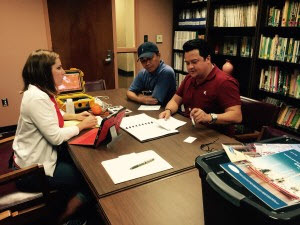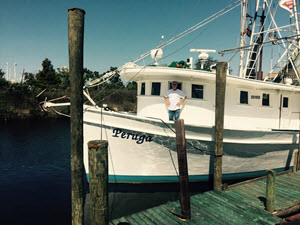
Heather Dippold (left- CONCORDE Education & Outreach) meets with Peter Nguyen ( right close- Mississippi State University Coastal Research and Extension Center) and Captain Nguyen (far right) to discuss data collection and the community meeting. Photo credit: Jessica Kastler
While Consortium for oil spill exposure pathways in Coastal River-Dominated Ecosystems (CONCORDE) researchers sampled the northern Gulf to determine the paths and impacts of river outflow, a pair of citizen scientists, also commercial fishers, assisted from their own vessels. Hoang Nguyen Van of D’Iberville, Mississippi, and George Barisich of Ycloskey, Louisiana—Captain Nguyen and Captain George—took readings during the Fall Campaign as a carefully planned part of the overall effort to understand the physical and biological processes that dominate the area.
“We’re working to understand how oil could move through the coastal environment,” explained Outreach Coordinator Jessie Kastler. “This is very important to people who make their living harvesting Gulf fish, shrimp, and oysters.”
Captain Nguyen gathered data the last week in October in conjunction with the R/V Point Sur, while Captain George went out in early November alongside the Pelican. Both took readings on the depths at various GPS locations in the study area. They also sampled for water quality, but experienced some of the difficulties field scientists face in terms of weather and equipment issues presenting challenges to obtaining usable data.

Captain George stands aboard his vessel Peruga. Photo credit: Jessica Kastler
With the Fall Campaign effort behind her, Kastler is now concentrating on phase two of the outreach program. Both Captain Nguyen and Captain George come from cultures unique to the Mississippi and Louisiana coasts and common in the professional fishing community. Captain Nguyen is Vietnamese, one of many on the Gulf coast whose families came to the area as refugees from the Vietnam conflict in the latter part of the twentieth century. Captain George, on the other hand, is a Cajun who descends from generations that have relied on the Gulf for their livelihood. While many who identify as Cajuns have traditionally French surnames, large populations of people whose families originally hailed from the former Yugoslavia and the Canary Islands have been folded into the Cajun culture through the centuries. Each smaller subset of community has these traditions and cultural practices that color its approach to fishing. Understanding these nuances will help CONCORDE’s outreach staff better tailor outreach opportunities.
In light of this, Kastler plans to have Captain Nguyen and Captain George act as liaisons into their professional fishing and ethnic communities. With their assistance, CONCORDE will host community meetings to engage senior and early career scientists with area fishers. The evening programs will include an introduction to CONCORDE’s mission, an overview of what is currently known, and what scientists hope to learn. After the presentation at large, attendees will have an opportunity to join small groups of four to eight people—a mix of fishers, scientists, educators, and interpreters where necessary—to discuss the issues at hand.
Kastler says that while the overall goal is to educate the public regarding findings and to bolster the public trust in science through transparency, it’s important to stress that CONCORDE researchers can benefit from the contact as well. “We want to show members of the these communities that we want to learn from them,” Kastler said. “They’ve been out on the water for decades and know through experience what is typical for the area.”
Once the doors of communication are open, social media will be used to keep information flowing. Through Kastler’s leadership, CONCORDE already has an active presence on Facebook, where updates are posted regularly. During the Fall Campaign, educators and research staff blogged on the CONCORDE website from on board the research vessels. A goal of CONCORDE outreach is for fishers- or any local resident with questions about current issues- to turn to these outlets first for answers. “By the time we launch the Spring Research Campaign, I want people in the community who rely on the Gulf for their livelihood to know who we are and where we post information they can use,” said Kastler.
